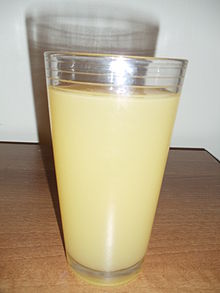

Apple juice is a fruit juice made by the maceration and pressing of apples. The resulting expelled juice may be further treated by enzymatic and centrifugal clarification to remove the starch and pectin, which holds fine particulate in suspension, and then pasteurized for packaging in glass, metal or aseptic processing system containers, or further treated by dehydration processes to a concentrate.

Due to the complex and costly equipment required to extract and clarify juice from apples in large volume, apple juice is normally produced commercially. In the United States, unfiltered fresh apple juice is made by smaller operations in areas of high apple production, in the form of unclarified apple cider. Apple juice is one of the most common fruit juices in the world, with world production led by China, Poland, the United States, and Germany.[1]
Health effects
Vitamin C is sometimes added by fortification, because content is variable,[2] and much of that is lost in processing.[citation needed] Vitamin C also helps to prevent oxidation of the product.[3] Other vitamin concentrations are low, but apple juice does contain various mineral nutrients, including boron, which may promote healthy bones.[4] Apple juice has a significant concentration of natural phenols of low molecular weight (including chlorogenic acid, flavan-3-ols, and flavonols) and procyanidins.[5] Apple juice has been shown to reduce oxidative stress on the brains of aging lab mice.[6] Research suggests that apple juice increases acetylcholine in the brain, possibly resulting in improved memory.[7] Despite having some health benefits, apple juice is high in sugar. It has 28 g carbohydrates (24 g sugars) per 230 g (8 ounces). This results in 130 calories per 230 g (8 ounces) – protein and fat are not significant. Also like most fruit juice, apple juice contains a similar amount of sugar as the raw fruit, but lacks the fiber content.
Apple cider
While apple juice generally refers to the filtered, pasteurised product of apple pressing, an unfiltered and sometimes unpasteurised product commonly known as apple cider in the United States and parts of Canada may be packaged and sold as apple juice. In the U.S., the opposite is often seen; filtered and clarified juice (including carbonated varieties) may be sold as "apple cider", thus there is an unclear distinction between filtered apple juice and natural apple cider.[8] In other places such as New Zealand, Australia and the United Kingdom, apple cider is an alcoholic beverage. The alcoholic beverage referred to as cider in these areas is usually referred to as hard cider in the United States.
See also
References
- ^ USDA Foreign Agricultural Service. World Apple Juice Situation. 2004-2005. Retrieved 2008-02-20.
- ^ Vitamin C in selected varieties
- ^ Sandringham Estate: Apple Juice
- ^ Parks and Edwards (2005) Boron in the Environment Retrieved 2008-08-13
- ^ Fractionation of polyphenol-enriched apple juice extracts to identify constituents with cancer chemopreventive potential. Henriette Zessner, Lydia Pan, Frank Will, Karin Klimo, Jutta Knauft, Regina Niewöhner, Wolfgang Hümmer, Robert Owen, Elke Richling, Norbert Frank, Peter Schreier, Hans Becker and Clarissa Gerhauser, Molecular Nutrition & Food Research, Supplement: Natural Products and Dietary Prevention of Cancer, Volume 52, Issue Supplement 1, pages S28–S44, June 2010, doi:10.1002/mnfr.200700317
- ^ Lawson, Willow (March 8, 2006). "Apples and apple juice contain antioxidants that protect cells throughout the body, particularly the brain and heart". Psychology Today. Retrieved 2010-06-19.
- ^ Apple Juice May Boost Memory. WebMD
- ^ What's the difference between apple juice and apple cider?, The Straight Dope. Retrieved 2008-02-20.
External links
- Production of cloudy and clear natural Apple juice
- Video on production of unclarified organic apple juice on The Sandringham Estate, England
- Apple juice benefits
| Fruit juice | ||
|---|---|---|
| Vegetable juice | ||
| Animal liquid | ||
| Related | ||
